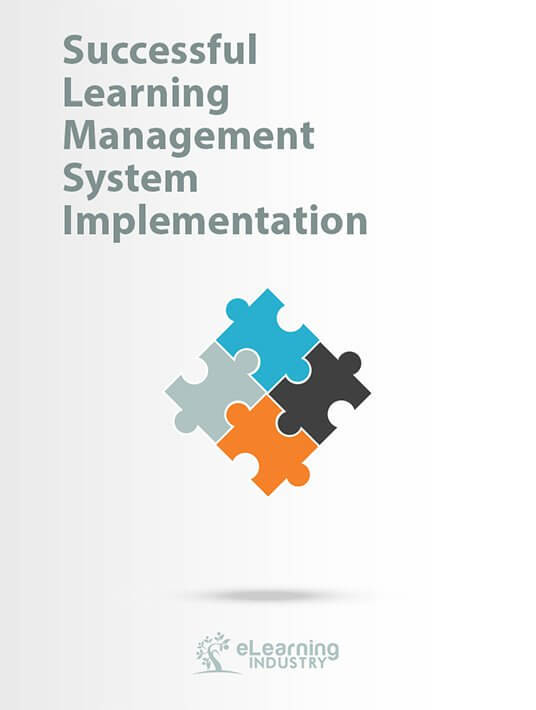Successful LMS Implementation: Best 32 LMS Implementation Tips From The Top LMS Experts
When it comes to utilizing best practices toward driving successful LMS implementation, there are certain LMS experts you should definitely turn to for advice. In this article, I'll highlight the top tips they have been asked to share about the best LMS implementation practices.

eBook Release
Successful Learning Management System Implementation
Top Learning Management Systems Experts share their personal stories and anecdotes.
- We kick things off with Claudio Erba (Docebo), who advises us to know the LMS vendor’s toolkit and what this includes as far as implementation techniques, training, and online support go. Securing a seamless transition after the LMS implementation process is what’s going to be decisive in constituting this task successfully and align with the company’s corporate goals.
- Effective Project Management calls for creating a detailed LMS project timeline. Tridib Roy Chowdhury (Adobe Systems), highlights how essential it is for companies to take advantage of modern Project Management tools to allocate and schedule tasks, as well as to coordinate project team members.
- Christos Mathiopoulos (Epignosis LLC), utilizing noteworthy expertise in the delivery of numerous LMS implementation projects, is an advocate of how vital it is to turn LMS implementation expectations into requirements. Success of the enterprise heavily relies on presenting client expectations in a crystal clear way, so that those involved in the process know what to expect.
- Testing out the LMS before you buy is of the utmost importance as Brendan Noud (LearnUpon) suggests. Brendan’s extensive experience in the field of eLearning has shown him that there is no “one key fits all” option when it comes to selecting the right LMS to cater to the needs of a company. Many companies offer the chance for a demonstration of the platform’s features before the actual purchase, so make sure you make the most out of that.
- John Peebles (Administrate) emphasizes the need to define the measurement and reporting strategy in advance. Successful LMS implementation equals being able to inform various audiences such as instructors and executives on their performance. Your new LMS should provide such features and enable you to notify the aforementioned audiences in a rapid and easy way.
- Finding a strong LMS sponsor is what Glenn Craig Maurer (Expertus, Inc.) regards as the most noteworthy aspect of every LMS implementation project. Your LMS sponsor has to set clear goals that are espoused by every person in the company. It's also advisable to denote one person from every department as responsible for ensuring the LMS lives up to department employees' expectations.
- Successful LMS implementation equals behavioral change, suggests Juliette Denny (Growth Engineering) putting engagement at the heart of every newly designed eLearning course. If you manage to craft an irresistibly learner-involving experience that goes beyond traditional boringly repetitive approaches, then you have a win-win scenario for both sides.
- Understanding that engagement is the goal is truly vital, but how can you actually tell that your online learners are truly engaged? Steve Dineen (Fuse Universal) proposes embracing a “learning organization” culture, which will then make a new LMS implementation much more successful and easier.
- It’s all about defining and reaching narrowed down LMS implementation objectives, states Thomas De Praetere (Dokeos). Successful LMS Implementation can contribute to aligning different corporate objectives, training employees on government regulation compliance, and how to promote products to clients, and providing new information to employees in an effective way.
- Organization and scheduling is key in any corporate endeavor. Linda Emerson (iSpring Solutions) believes that creating a checklist of LMS implementation requirements for a LMS can significantly assist eLearning software vendors in various aspects of Project Development such as content support, features included, as well as integration with other systems.
- Have you budgeted for all LMS implementation project requirements? Have you considered additional costs that may come up in the process of modifying the LMS to suit your employees respective needs? These are questions that definitely need to be made, says Linda Bowers (WBT Systems).
- Ann K. Robatin Fuerst, Ph.D. (CoreAxis Consulting) stresses the importance of a stellar Welcome/Home Page that is characterized by feature variety and functions as a good first point of contact with online learners.
- Annika Willers (Coursepath) eloquently demonstrates the need for Learning Management Systems to involve and empower Learning Management System users by means of their appealing and modern User Interface, which should be easy to navigate and structured in a meaningful way.
- As with all interactions, especially in a teaching context, the role of knowing your audience comes once again into the foreground. Ariana Lopez Di Rocco (Teachlr) suggests that we have to ask online learners some fundamental questions and try to gain as much insight as possible about them.
- Arun Prakash (InfoPro) raises the issue of task allocation to people who are equipped with the right skills to see it through. Arun identifies 3 key areas in any LMS implementation project one should strategically target to avoid any future mishaps: Content Delivery (WBT & ILT), Business Unit and IT.
- Hey, I am busy. You are busy. Everybody is busy. Why should your employees care for a new LMS? Most people resist change, especially when it comes to slowing down their work routine or getting them out of their comfort zone. Well, Brian Leach (Unboxed Technology, LLC) and Sayan Guha (G-Cube) provided two very good tips. Let your employees know how they will benefit, recognize this is change management, and market the LMS well for your learners.
- Realistic LMS implementation timescales are of the essence! According to Colin Bull (Digits Industries Ltd), breaking down the whole LMS implementation process into manageable phases, enables you to supervise your LMS implementation project adequately, and directly involves users in the process as well.
- Don Berghoff (Cogentys) emphasizes how crucial creating your curriculum is, and how important it is to form the right strategy towards equipping your employees with new work skills.
- We hate overly difficult procedures! One of the reasons companies despise eLearning programs is because of some bad experience with an immensely complex Learning Management System. That’s why Edward Gipple (ICS Learning Group Inc.) mentions the significance of Learning Management System automation to the fullest extent possible.
- Now let’s get down to procedures. Learning Management System data migration is inevitable if you want to make your LMS implementation a successful one. Erin Pavane (Abila) says that the issue of how, when and what content needs to be migrated is something that should be discussed in the initial planning stage to determine what solutions the LMS vendor can offer to make it as easy as possible.
- As with all new enterprises, one must be able to calculate a reasonable LMS Implementation time frame and always anticipate and leave time for mishaps, according to Francis Kneebone (Cognition E-Learning).
- Everything in life is about discovering your true purpose. LMSs adhere to that same principle. Both Graham Glass (CYPHER LEARNING) and Sandi Lin (Skilljar) illustrate the importance of defining what you need your new LMS for, establishing its purpose, as well as defining and scoping the project, indicating factors that profoundly influence successful LMS implementation.
- Jenny Shaw, PMP (SilkRoad) makes reference to the importance of LMS vendor selection and preparing your own LMS implementation resources in the planning phase of the LMS implementation project. Careful consideration of these two key aspects goes a long way in saving time and money afterwards.
- Having the right Learning Management System setup aids greatly in successful LMS implementation. It should allow online learners to access it from any device, have minimal maintenance costs, highly automated processes, and extensive customization features, says Justin Panté (Velpic).
- Ken Flesher (SkillBuilder LMS) puts focus on identifying key technical LMS implementation challenges. Data migration is a ubiquitous pain and a big challenge in LMS change processes.
- When it comes to successful LMS implementation considering the “where” as far as online learners go is key, according to Laura Sykes (Absorb LMS). Selecting optimal content formats that cater to your employees' versatile needs, such as accessing online training courses from various devices with different connection speeds, is crucial.
- Meredith Henson (Totara Learning Solutions) considers change management in data migration extremely significant. Finding the right amount of information to be migrated into the new LMS is key. However, maintaining the right balance between under-informed and over-informed stakeholders is of the essence.
- Compatibility of an LMS with the company’s strategy can make or break an attempt for LMS implementation. Defining the scale to which the LMS will be used and if the company actually needs an LMS in essence are crucial factors to consider, mentions Nick Brown.
- Ranjan Kumar (Learnyst) is a firm believer of the need to identify key LMS resources and core LMS implementation team. Selecting optimal LMS products that cater to the respective company requirements plays a very important role in that sense.
- Employees and stakeholders don’t just espouse the need to do something. You have to present adequately how the change you are introducing will solve an existing problem. Establishing effective communication regarding the problem the new LMS tackles solves this issue, according to Tami Schiller (TutorPro).
- Don’t forget LMS security! We live in a world full of peril and a successful LMS can only be an LMS that secures your content, says Tim Buff (Agylia).
- Test your LMS, test again, and then test more! Viren Kapadia (Gyrus Systems) suggests that the LMS team needs to make numerous checks to ensure flawless operation with no mishaps.
Well, that was it. Check out our eBook library to uncover more LMS implementation tips from the leading experts.
Originally published on February 28, 2017









